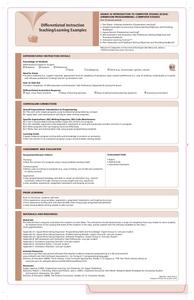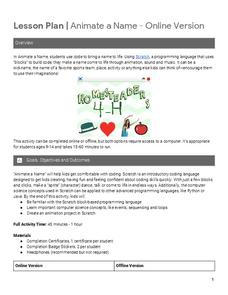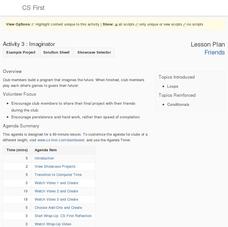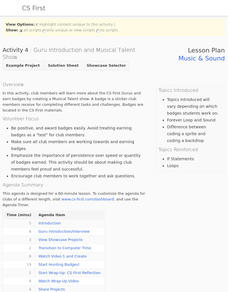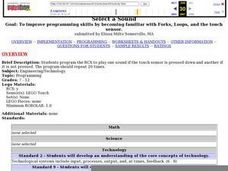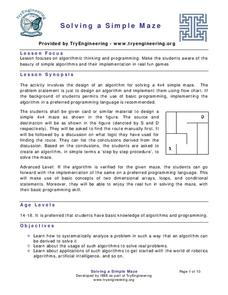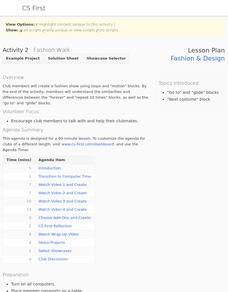EngageNY
The Graph of a Function
Mathematics set notation can be represented through a computer program loop. Making the connection to a computer program loop helps pupils see the process that set notation describes. The activity allows for different types domain and...
Ontario
Animation Programming—Computer Studies
Introduce high schoolers interested in animation programming to fundamental programming concepts so that they can plan and write simple programs.
Code.org
Looping and Random Numbers
Repetition, repetition, repetition. Get your class to efficiently repeat a section of code over and over again by introducing looping. Class members learn looping to quickly recreate objects they want to appear more than once in their...
Code.org
While Loops
Bring your pupils in the loop with while loops. Scholars learn how to modify conditional statements to produce while loops in the 14th instructional activity of the series. They use flowcharts to understand loops and then program...
Code.org
Looping and Simulation
Young computer scientists continue programming with while loops by creating a program to simulate coins flipping.
College Board
AP® Computer Science: A Picture Lab Student Guide
How do you modify digital pictures? In this lab learners write methods that modify digital pictures. They how to traverse a two-dimensional array of integers or objects, and are introduced to nested loops, binary numbers,...
Curated OER
Error Checking Loops
Students examine error checking loops. Students explore the use of loops to prevent erroneous data from being entered into a computer. They demonstrate when and where to use an error correcting loop. Students present the proper structure...
Google
Animate a Name
What's in a name? Pupils use the Scratch code blocks to animate letters in a name. They learn about events, sequencing, and loops in computer science by taking part in the project.
Google
Adventure on the High Seas
Ahoy there! A fun computer science instructional activity challenges pupils to write a program that creates an ocean wave. They then develop stories to accompany their projects. All of this takes place within the Scratch coding program.
Google
Friends: Imaginator
What does a future as a computer scientist look like? Pupils learn about loops in computer coding by writing a story about the future. They include the repeat until and wait blocks in the Scratch program to incorporate these loops.
Code.org
Minecraft Hour of Code
Devote an hour to computer coding ... it's time well spent! The activity has young computer scientists write code to solve puzzles in the Minecraft game. They learn how to apply block codes and repeat loops.
Google
Music and Sound: Guru Introduction and Musical Talent Show
Become talented in computer science. After interviewing a computer science guru, pupils work on individual projects related to a virtual music talent show. They learn how to use different code blocks in the Scratch programming language,...
Curated OER
Select a Sound: RCX Programming
Students program an RCX to play one sound if a touch sensor is pressed down and another if it is not pressed. They write the program to repeat twenty times and incorporate the use of both a fork and a loop.
Curated OER
Variable Arrays
Twelfth graders compare and contrast variables and arrays. Using data, they enter the information into a spreadsheet and an array to compare how they appear. To end the lesson, they complete basic programs in which they use arrays.
TryEngineering
Solving a Simple Maze
Solve a maze ... from a robot's point of view. In the lesson, your scholars build a small, simple maze from cardboard and then find a route from the start point to the finish point. They write an algorithmic process that a robot could...
Code.org
Processing Arrays
Scholars use a playing card activity to help them develop a program to find the minimum value of a list. They learn to use for loops to write code that will process lists.
Google
Fashion and Design: Fashion Walk
Strut your stuff, just on a computer and not on a fashion runway. Scholars program a fashion show animation using block-based computer coding. They learn how to apply different code blocks in writing their programs.
Drexel University
Learning Roomba Module 4: Sensors and Actuators
Introduce your classes to sensors and actuators in robots — specifically to the Roomba. Pupils develop programs that make Roomba utilize its different sensors.
EngageNY
The Graph of the Equation y = f(x)
Math language? Set notation is used in mathematics to communicate a process and that the same process can be represented as computer code. The concept to the loop in computer code models the approach pupils take when creating a solution...
Curated OER
GarageBand Orientation
Students create short percussion pieces using the computer program GarageBand. Emphasis is placed on student feedback and discussion after performances of the songs are complete.
Curated OER
Web Design
Students are introduced to the seven web design elements. Using examples, they identify the use of good and bad elements. They work with a computer program to help them design their own website and share them with the class.
Curated OER
Vocabulary Scavenger Hunt
Students define vocabulary words prior to reading "The Most Dangerous Game" in this interactive language arts lesson that effectively integrates technology. This lesson requires internet access, a mobile computer lab, and an instant...
Curated OER
Highway Design for the Future
Eighth graders research highway designs and create a marble maze to illustrate a highway system. They test their designs and write reports defining the project and analyzing the results.
Curated OER
Can You Hear a Story?
Learners gain an understanding of relationships between music and language arts. They analyze a story and create a musical composition that reflects and enhances the story. The musical accompaniment will be produced in a book on tape.

